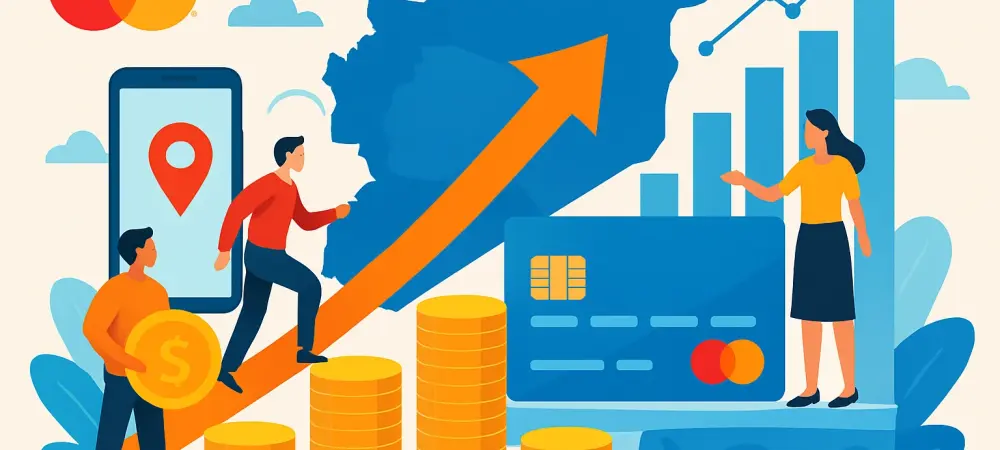What if a nation long isolated by conflict could suddenly connect to the global economy through a simple swipe or tap? In Syria, where millions have struggled without access to modern financial tools, Mastercard’s groundbreaking partnership with the Central Bank of Syria is turning this possibility into reality. This collaboration, cemented by a recent memorandum of understanding (MoU), is not just about introducing digital payments—it’s about rebuilding trust, fostering hope, and empowering a population eager for economic progress. Dive into this transformative journey as Mastercard paves the way for a new financial era in Syria.
A Beacon of Financial Hope
The significance of this partnership cannot be overstated in a country where years of turmoil have left the financial system fragmented. With a large portion of the population unbanked—estimates suggest over 70% lack access to formal banking services—Syria stands at a critical juncture. Mastercard’s involvement signals a shift toward inclusion, promising to bridge the gap between local needs and global opportunities. This initiative is poised to redefine how Syrians interact with money, from daily transactions to international trade.
This story of transformation goes beyond mere technology. It represents a lifeline for small businesses, rural communities, and individuals who have long been excluded from the financial mainstream. By aligning with international standards, the MoU aims to create a ripple effect, stimulating economic growth and restoring confidence in Syria’s financial institutions. The stakes are high, but so is the potential for meaningful change.
The Urgent Need for a Payment Overhaul
Syria’s financial ecosystem has faced immense challenges, with infrastructure crippled by conflict and economic sanctions limiting access to global markets. Cash remains king in most transactions, with digital payments accounting for a negligible fraction of economic activity. This reliance on physical currency stifles growth, increases risks of theft, and excludes many from participating in a broader economy. A revolution in payments is not just desirable—it’s essential for survival and progress.
Mastercard’s entry into this landscape offers a chance to rebuild from the ground up. The focus is on creating a secure, efficient system that can withstand local challenges while connecting to the world. This isn’t merely about introducing credit cards or mobile payments; it’s about laying the foundation for economic resilience. As digital transactions become the norm globally, Syria risks falling further behind without such interventions, making this partnership a timely catalyst for change.
Core Strategies Driving Change
Mastercard’s collaboration with the Central Bank of Syria rests on several key strategies designed to modernize the payment infrastructure. First, integration with global standards ensures that Syrian banks can facilitate cross-border transactions, enhancing credibility and opening new avenues for trade. This alignment is crucial for attracting foreign investment and supporting Syrians living abroad who send remittances home. The goal is a seamless connection to the international financial network.
Another pillar is financial inclusion, targeting the underserved through innovative digital solutions. Whether it’s enabling mobile wallets for rural farmers or debit cards for small merchants, the aim is to bring banking to those previously left out. Additionally, capacity building through training programs and technical exchanges equips local professionals with the skills to sustain this transformation. These efforts, backed by Mastercard’s extensive expertise, are customized to address Syria’s unique hurdles while fostering long-term stability.
Insights from Key Leaders
Voices at the helm of this initiative reflect a unified vision for Syria’s financial future. Dr. Abdulkader Husrieh, Governor of the Central Bank of Syria, has emphasized Mastercard’s role as a strategic ally in bolstering the nation’s payment systems. His confidence highlights a belief that this collaboration can drive inclusion and rebuild trust among citizens. Such endorsements from top leadership signal a commitment to turning policy into tangible impact.
Echoing this sentiment, Adam Jones, Division President of West Arabia at Mastercard, has expressed enthusiasm for designing a payment ecosystem that serves both locals and international visitors. He pointed to the promise of cutting-edge tools and robust support as cornerstones of this effort. These statements from both sides underscore a shared dedication to not only implement change but also inspire a broader movement toward economic empowerment in Syria.
Steps Toward a Digital Tomorrow
For Syrians and stakeholders ready to embrace this shift, the partnership outlines practical measures to ensure progress. Engaging in knowledge-sharing sessions, such as workshops hosted by Mastercard and the Central Bank, offers a chance to learn about digital payment systems and adopt best practices. These opportunities are vital for building a foundation of understanding among businesses and individuals alike, ensuring no one is left behind in this transition.
Beyond education, there’s an invitation for financial institutions to integrate with Mastercard’s global network, enhancing transaction efficiency and market reach. Staying updated on joint initiatives will also be key, as new tools and services are rolled out to meet everyday needs. These actionable steps transform the MoU from a high-level agreement into real-world benefits, empowering communities to take charge of their financial futures through accessible, modern solutions.
Reflecting on a Milestone Achievement
Looking back, the alliance between Mastercard and the Central Bank of Syria stood as a pivotal moment in the nation’s journey toward economic recovery. It marked the beginning of a concerted effort to dismantle barriers that had long isolated Syrians from global financial systems. The focus on inclusion, innovation, and capacity building ignited a spark of optimism among a population yearning for stability.
As this partnership unfolded, the next steps became clear: continued collaboration to refine digital tools, expand access in remote areas, and monitor the impact on local economies. Stakeholders were encouraged to remain engaged, supporting initiatives that could further integrate Syria into the global market. This chapter of transformation, rooted in technology and trust, offered a blueprint for other nations facing similar challenges, proving that resilience could pave the way for renewal.

